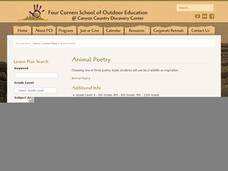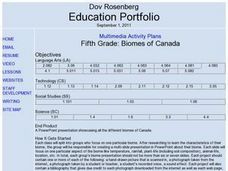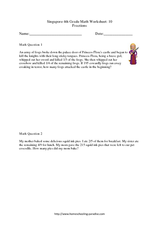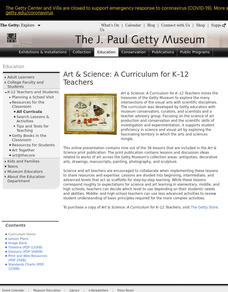Curated OER
Adaptation and Diversity on Sheffield Island
Written for an exploration of shoreline ecosystems on Sheffield Island, this gives ecology or marine biology buffs a hands-on experience. Using GPS or visual triangulation techniques, they lay transect lines on a high and a low energy...
Curated OER
Animal Poetry
Fourth graders write poems that use local wildlife as their inspiration. After a class discussion which produces a list of wildlife that pupils have seen in their town, a review of three types of poetry ensues. They look at how...
Curated OER
Report on Desert Plant or Animal
Students are introduced to desert plants and animals. They demonstrate that the name of an organism does not always match the object. Students perform a guided internet search in order to complete a report.
Curated OER
Red Leaf, Yellow Leaf
Students discuss the differences between a storybook and an information book. Students use various materials found in nature to make a nature collage. Students make a nature dictionary using pictures and their own definitions from the...
Curated OER
Wildlife Conservation III
Discuss the importance of wildlife conservation. Learners talk about the animals and plants on the US Fish and Wildlife Services list of endangered and threatened species. Then, they engage in a detailed discussion of the reasons these...
Curated OER
Get In Touch With Trees
Learners feel tree parts inside of 3 mystery boxes. Then they go outside and find the 3 trees the parts came from. They draw their favorite tree including details of the part they felt.
Curated OER
Conservation in Small Spaces: Conservation
Students define conservation, identify actions that conserve habitat and those that reduce habitat, and generate ideas about how one can practice conservation in everyday life.
Curated OER
Biomes of Canada
Fifth graders, in groups, research one of the biomes of Canada. They create a multi-slide PowerPoint presentation about their biome that contains specific types of inserted/downloaded pictures, recorded voice, and a sound effect.
Curated OER
Technology Squares: Mammals
Review basic vocabulary related to mammals. This short quiz game allows students to test their skills and understanding of scientific vocabulary. This game is appropriate for grades 5-7 and covers very basic concepts.
Curated OER
Class Presentation on Coal
Did you know that coal was formed from plants? After being assigned a coal-related topic, groups gather, organize, and present information about this energy source. The presentations should include visuals like graphs, charts, tables,...
Curated OER
Hatchet
Students write about a time when they were in a situation where nature frightened them. They write about how Brian solved the problem of how to start a fire in the story. Students complete a short research paper on one of the plants or...
Curated OER
What Land Works Best?
Fourth graders explore different types of land. For this land lesson, 4th graders investigate how water, climate, and soil type determine what types of crops may be grown. Students discover these elements while playing an interactive game.
Curated OER
Working Worms
Fourth graders examine earthworms. In this earthworm lesson, 4th graders investigate how earthworms help prepare soil for planting. Students examine other living and nonliving elements in a garden habitat.
Curated OER
Cultural Murals
Seventh graders research the cultural time period of early Wisconsin people. They create a mural depicting the diet, shelter, activities, climate, clothing, tools, and other materials used.
Curated OER
Vermicomposting
Fifth graders explore agriculture by viewing compost related presentations. In this worm and soil lesson, 5th graders identify the relationship between good soil and the worms who inhabit it by reading assigned text in class. Students...
Curated OER
Exploring Texture In the Garden
Students explore the garden environment. In this garden environment lesson, students investigate the needs and parts of a plant. Students discover the differences between fruits and vegetables while creating their own garden.
Curated OER
Colored Dots 1
Students observe that colored markers are a mixture of many different colors by performing a chromatography experiment. They make observations, record information, and make generalized inferences from their observations.
Curated OER
Singapore 4th Grade Math Worksheet: 10: Fractions
For this problem solving worksheet, learners read and solve 20 word problems. The problems will require reading a short paragraph each, but use basic operations to solve. All problems contain fractions.
Curated OER
Clearly Classified
Young scholars review the classification system for living organisms and apply it the classification of insects and flowers in the still life by Ambrosius Bosschaert. They create a chart classifying the animals and plants in the painting...
Curated OER
Soil Composition
Young scholars examine soil. In this soil composition instructional activity students participate in soil sedimentation and filtration activities. The young scholars discuss what non-living and living things are in soil and why it is so...
Curated OER
Plant and Animal Cells - Are they Different?
Learners observe the similarities and differences between plant and animal cells. In this cell activity, students use microscopes to observe self prepared slides of animal and plant cells.
Curated OER
An Environmental Puzzle: The Carbon Cycle
Students are introducced to how respiration and photosysnthesis cycle carbon through ecosystems. They read background information that describes the role of the Sun as Earth's ultimate energy source and explains how the energy...
Curated OER
Botanical Garden Field Trip
Students take a field trip to a botanical garden. In this habitat lesson, students walk through the garden and see various species of plants and animals. Students take a canopy walk and see coniferous trees. Students write about what...
Curated OER
The Effects of Pesticides on the Food Chain
Fourth graders generalize that all animals, including people, depend on plants as a food source. In this science lesson plan, 4th graders describe and construct a food chain, tell how pesticides enter the food chain, and discuss possible...























